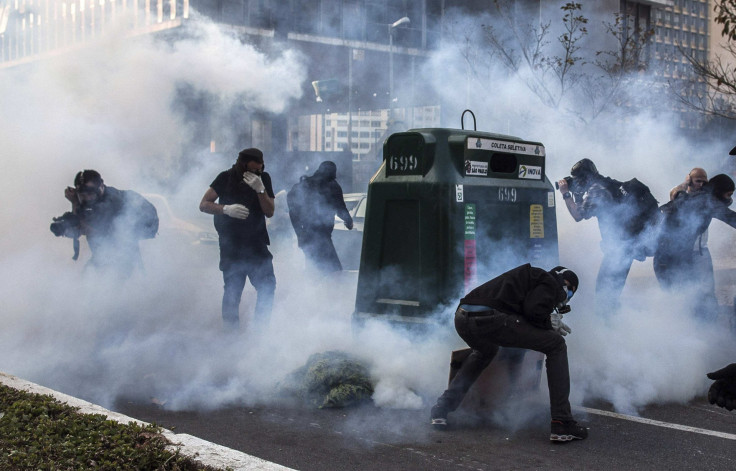Brazil Independence Day Celebrations Marred By Nationwide Protests Over Poor Public Services, Corruption

Brazil’s Independence Day celebrations turned violent on Saturday when festivities were overshadowed by massive protests across 150 cities calling for improved public services and an end to corruption by politicians and big businessmen.
Protesters also assailed the government’s huge public expenditures on upcoming international sporting events like the soccer World Cup and the Olympics.
This new round of demonstrations, which follow protests over social conditions that roiled the country in June, resulted in more than 300 arrests, at least 35 people injured, and evacuations of entire neighborhoods in Rio de Janeiro and São Paulo.
Protesters intercepted the traditional Seventh of September parade by the army in Rio de Janeiro, a traditional part of the Independent Day celebrations. The parade was going through the Avenida Getulio Vargas, in the heart of the city, when it was disrupted by thousands of demonstrators. Police sprayed tear gas and shot rubber bullets at rock-throwing members of the crowd, which comprised a mix of protesters, parade participants and journalists.
"They [police] never spoke to us. They came in great numbers and began throwing tear gas canisters," a student protester named Leticia Hellen told Agencia Brasil.
A 63-year-old woman named Josefa da Silva, who was affected by the tear gas, lamented: "I never thought I would go through this. My God! In such a beautiful country.”
A reporter for O estado de São Paulo had to be hospitalized, while the TV Globo network’s broadcast of the parade was interrupted.
Local media outlets emphasized the fact that journalists were attacked simply while doing their job, calling it a violation of the fundamental right to information.
In other cities, parades were canceled due to fear of violence from the demonstrations, which had been called days before on social media. Many other cities, like the capital of Brasilia, witnessed more-muted participation than in previous years -- only 5,000 people attended on Saturday, versus an expected 50,000. In São Paulo, many official balconies were empty for the first time in its history as a crowd of thousands marched through the streets demanding social justice.
"We want better education, political reforms and media democratization. The June protests served to push Congress to approve measures -- we have to keep them alive," a student protester name Philip Leite told the Agence France Presse news agency.
In defiance of a government edict that protesters should not cover their faces with bandanas, many demonstrators obscured their appearances, including singer-songwriter Caetano Veloso, who was seen chanting the slogan “Forbidden to forbid.”
But journalist Reinaldo Azevedo praised the decision of the authorities to forbid protesters to cover their faces, saying that “Brazil is not a dictatorship” and that everybody should feel free to identify themselves when protesting.
Speaking in Brasilia, President Dilma Rousseff commented that there is "still a lot to be done" in Brazil and that "urgent problems to be addressed and the population has the right to demand changes.”
But she added that the country had "progressed as never before in the last few years."
Brazil declared independence from Portugal on Sept. 7, 1822.
© Copyright IBTimes 2024. All rights reserved.




















